Central Teacher Eligibility Test Paper 1 and 2
One of the essential qualifications for a person to be eligible for appointment as a teacher in any of the schools referred to RTE Act is that he/she should pass the Teacher Eligibility Test (TET) which will be conducted by the appropriate Government in accordance with the guidelines framed by the NCTE.
Central Teacher Eligibility Test is an important examination for the candidates who are preparing to make their future as a school teacher.
CTET is the eligibility test to get a job as a teacher from class 1 to 8. It is mandatory to pass CTET to become a teacher in Kendriya Vidyalaya, Navodaya Vidyalaya, Tibetan Schools and CBSE affiliated schools.
The Ministry of Education, Govt. of India has entrusted the responsibility of conducting the Central Teacher Eligibility Test (CTET) to the Central Board of Secondary Education Delhi.
- Minimum Qualifications for becoming Teacher for Classes I-V : Primary Stage
Senior Secondary (or its equivalent) with at least 50% marks and passed or appearing in final year of 2-year Diploma in Elementary Education (by whatever name known)
OR
Senior Secondary (or its equivalent) with at least 45% marks and passed or appearing in final year of 2-year Diploma in Elementary Education (by whatever name known), in accordance with the NCTE (Recognition Norms and Procedure), Regulations, 2002.
OR
Senior Secondary (or its equivalent) with at least 50% marks and passed or appearing in final year of 4-year Bachelor of Elementary Education (B.El.Ed).
OR
Senior Secondary (or its equivalent) with at least 50% marks and passed or appearing in final year of 2-year Diploma in Education (Special Education)*.
OR
Graduation with at least 50% marks and Bachelor of Education (B. Ed).
Who has acquired the qualification of Bachelor of Education from any NCTE recognized institution shall be considered for appointment as a teacher in classes I to V provided the person so appointed as a teacher shall mandatorily undergo a six month Bridge Course in Elementary Education recognized by the NCTE, within two year of such appointment as primary teacher.
- Minimum Qualifications for becoming Teacher for Classes VI-VIII : Elementary Stage :
Graduation and passed or appearing in final year of 2-year Diploma in Elementary Education (by whatever name known).
OR
Graduation with at least 50% marks and passed or appearing in 1-year Bachelor in Education (B.Ed).
OR
Graduation with at least 45% marks and passed or appearing in 1-year Bachelor in Education (B.Ed), in accordance with the NCTE (Recognition Norms and Procedure) Regulations issued from time to time in this regard.
OR
Senior Secondary (or its equivalent) with at least 50% marks and passed or appearing in final year of 4-year Bachelor in Elementary Education (B.EI.Ed).
OR
Senior Secondary (or its equivalent) with at least 50% marks and passed or appearing in final year of 4-year B.A./B.Sc.Ed or B.A.Ed/B.Sc.Ed.
OR
Graduation with at least 50% marks and passed or appearing in 1-year B.Ed. (Special Education)*.
OR
Any candidate having qualified B.Ed. Programme recognized by the NCTE is eligible to appear in TET/CTET. Moreover, as per the existing TET guidelines circulated vide NCTE letter dated 11-02-2011, a person who is pursuing an of the teacher education courses dated 23 August 2010 is also qualified to appear in the TET/CTET.
- Structure and Content of CTET
All questions in CTET will be Multiple Choice Questions (MCQs), with four alternatives out of which one answer will be correct. Each carrying one mark and there will be no negative marking.
There will be two papers of CTET.
(i) Paper I will be for a person who intends to be a teacher for classes I to V.
(ii) Paper II will be for a person who intends to be a teacher for classes VI to VIII.
Note : A person who intends to be a teacher for both levels (classes I to V and classes VI to VIII) will have to appear in
both the papers (Paper I and Paper II).
Paper I (for Classes I to V) Primary Stage :
Duration of examination-Two-and-a-half hours
Structure and Content (All Compulsory) : (Appendix I)
(i) Child Development and Pedagogy 30 MCQs 30 Marks
(ii) Language I (compulsory) 30 MCQs 30 Marks
(iii) Language II (compulsory) 30 MCQs 30 Marks
(iv) Mathematics 30 MCQs 30 Marks
(v) Environmental Studies 30 MCQs 30 Marks
Total 150 MCQs 150 Marks
- Nature and Standard of questions :
- The test items on Child Development and Pedagogy will focus on educational psychology of teaching and learning relevant to the age group of 6-11 years. They will focus on understanding the characteristics and needs of diverse learners, interaction with learners and the attributes and qualities of a good facilitator of learning.
- The Test items in Language I will focus on the proficiencies related to the medium to instruction.
- The Test items in Language II will focus on the elements of language, communication and comprehension abilities.
- Language II will be a language other than Language I. A candidate may choose any one language as Language I and other as Language II from the available language options and will be required to specify the same in the Confirmation Page.
- Opt two languages in which you wish to appear for CTET : List of languages and code are as follows :
| Language |
Code No. |
Language |
Code No. |
Language |
Code No. |
Language |
Code No. |
| English |
01 |
Gujarati |
06 |
Marathi |
11 |
Sanskrit |
16 |
| Hindi |
02 |
Kannada |
07 |
Mizo |
12 |
Tamil |
17 |
| Assamese |
03 |
Khasi |
08 |
Nepali |
13 |
Telugu |
18 |
| Bangali |
04 |
Malayalam |
09 |
Oriya |
14 |
Telugu |
19 |
| Garo |
05 |
Manipuri |
10 |
Punjabi |
15 |
Urdu |
20 |
- The Test items in Mathematics and Environmental Studies will focus on the concepts, problem solving abilities and pedagogical understanding and applications of the subjects. In all these subject areas, the test items will be evenly distributed over different divisions of the syllabus and applications of that subject prescribed for classes I-V by the NCERT.
- The questions in the test for Paper I will be based on the topics prescribed in syllabus of the NCERT for classes I-V but their difficulty standard as well as linkages, could be up to the Secondary stage.
Paper II (for Classes VI to VIII) Elementary Stage :
Duration of examination – Two-and-a-half hours
Structure and Content (All Compulsory) : (Appendix I)
(i) Child Development & Pedagogy (compulsory) 30 MCQs 30 Marks
(ii) Language I (compulsory) 30 MCQs 30 Marks
(iii) Language II (compulsory) 30 MCQs 30 Marks
(iv) Mathematics and Science (for Mathematics and Science teacher) 60 MCQs 60 Marks
(v) Social Studies/Social Science 60 MCQs 60 Marks
(for Social Studies/Social Science teacher)
For any other teacher-either (IV) or (V)
Total 150 MCQs 150 Marks
- Nature and standard of questions :
- The test items on Child Development and Pedagogy will focus on educational psychology of teaching and learning, relevant to the age group of 11-14 years. They will focus on understanding the characteristics, needs and psychology of diverse learners, interaction with learners and the attributes and qualities of a good facilitator of learning.
- The Test items in Language I will focus on the proficiencies related to the medium of instruction.
- The Test items in Language II will focus on the elements of language, communication and comprehension abilities.
- Language II will be a language other than Language I. A candidate may choose any one language as Language I and other as Language II from the available language options and will be required to specify the same in the Confirmation Page.
- Opt two languages in which you to appear for CTET : List of languages and code are as follows :
| Language |
Code No. |
Language |
Code No. |
Language |
Code No. |
Language |
Code No. |
| English |
01 |
Gujarati |
06 |
Marathi |
11 |
Sanskrit |
16 |
| Hindi |
02 |
Kannada |
07 |
Mizo |
12 |
Tamil |
17 |
| Assamese |
03 |
Khasi |
08 |
Nepali |
13 |
Telugu |
18 |
| Bangali |
04 |
Malayalam |
09 |
Oriya |
14 |
Telugu |
19 |
| Garo |
05 |
Manipuri |
10 |
Punjabi |
15 |
Urdu |
20 |
-
- The Test items in Mathematics and Science and Social Studies/Social Science will focus on the concepts, problem solving abilities and pedagogical understanding of the subjects. The test items of Mathematics and Science will be of 30 marks each. The test items will be evenly distributed over different divisions of the syllabus of that subject as prescribed for classes VI-VIII by the NCERT.
- The questions in the test for Paper II will be based on the topics prescribed in syllabus of the NCERT for classes VI-VIII but their difficulty standard as well as linkages, could be up to the Senior Secondary stage.
- Language of the Question Paper
Main question paper shall be bilingual (Hindi/English).
As per NCTE Notification No-76-4/2010/NCTE Acad dated : 10-02-2011 : A person who score 60% more in the TET will be considered as TET pass.
- Validity Period of CTET Certificate
The Validity Period of CTET qualifying certificate for appointment will be for life time for all categories.
There is no restriction or the number of attempts a person can take for requiring a CTET certificate.
A person who has qualified CTET may also appear again for improving his/her score.
SYLLABUS
Paper I (for classes I to V) Primary Stage
- Child Development and Pedagogy 30 Questions
(a) Child Development (Primary School Child) 15 Questions
- Concept of development and its relationship with learning
- Principles of the development of children
- Influence of Heredity & Environment
- Socialization processes: Social world & children (Teacher, Parents, Peers)
- Piaget, Kohlberg and Vygotsky : constructs and critical perspectives
- Concepts of child-centered and progressive education
- Critical perspective of the construct of Intelligence
- Multi Dimensional Intelligence
- Language & Thought
- Gender as a social construct; gender roles, gender-bias and educational practice
- Individual differences among learners, understanding differences based on diversity of language, caste, gender, community religion etc.
- Distinction between Assessment for learning and assessment of learning; School-Based Assessment, Continous & Comprehensive Evaluation: perspective and practice.
- Formulating appropriate questions for assessing readiness levels of learners; for enhancing learning and critical thinking in the classroom and for assessing learner achievement.
(b) Concept of Inclusive education and understanding children with special needs 5 Questions
- Addressing learners from diverse backgrounds including disadvantaged and deprived
- Addressing the needs of children with learning difficulties, ‘impairment’ etc
- Addressing the Talented, Creative, Specially abled Learners
(c) Learning and Pedagogy 10 Questions
- How children think and learn; how and why children ‘fail’ to achieve success in school performance
- Basic processes of teaching and learning; children’s strategies of learning; learning as a social activity; social context of learning.
- Child as a problem solver and a ‘scientific investigator’
- Alternative conceptions of learning in children; understanding children’s ‘errors’ as significant steps in the learning process.
- Cognition & Emotions
- Motivation and learning
- Factors contributing to learning-personal & environmental
- Language I. 30 Questions
(a) Language Comprehension 15 Questions
Reading unseen passages- two passages one prose or drama and one poem with questions on comprehension, inference, grammar and verbal ability (Prose passage may be literary, scientific, narrative or discursive)
(b) Pedagogy of Language Develoment 15 Questions
- Learning and acquisition
- Principles of language Teaching
- Role of listening and speaking; function of language and how children use it as a tool
- Critical perspective on the role of grammar in learning a language for communicating ideas verbally and in written form
- Challenges of teaching language in a diverse classroom; language difficulties, errors and disorders
- Language Skills
- Evaluating language comprehension and proficiency : speaking, listening, reading and writing
- Teaching-learning materials: Textbook, multi-media materials, multilingual resource of the classroom
- Remedial Teaching
III. Language-II 30 Questions
(a) Comprehension 15 Questions
Two unseen prose passages (discursive or literary or narrative or scientific) with questions on comprehension, grammar and verbal ability.
(b) Pedagogy of Language Development 15 Questions
- Learning and acquisition
- Principles of language Teaching
- Role of listening and speaking; function of language and how children use it as a tool
- Critical perspective on the role of grammar in learning a language for communicating ideas verbally and in written form;
- Challenges of teaching language in a diverse classroom; language difficulties, errors and disorders.
- Language Skills
- Evaluating language comprehension and proficiency: speaking, listening, reading and writing
- Teaching-learning materials: Texbook, multi-media materials, multilingual resource of the classroom
- Remedial Teaching
- Mathematics 30 Questions
(a) Content 15 Questions
- Geometry
- Shapes & Spatial Understanding
- Solids around Us
- Numbers
- Addition and Subtraction
- Multiplication
- Division
- Measurement
- Weight
- Time
- Volume
- Data Handling
- Patterns
- Money
(b) Pedagogical issues 15 Questions
- Nature of Mathematics/Logical thinking; understanding children’s thinking and reasoning patterns and strategies of making meaning and learning
- Place of Mathematics in Curriculum
- Language of Mathematics
- Community Mathematics
- Evaluation through formal and informal methods
- Problems of Teaching
- Error analysis and related aspects of learning and teaching
- Diagnostic and Remedial Teaching
- Environmental Studies 30 Questions
(a) Content 15 Questions
(i) Family and Friends :
1.1 Relationships;
1.2 Work and play;
1.3 Animals;
1.4 Plants;
(ii) Food
(iii) Shelter
(iv) Water
(v) Travel
(vi) Things We Make and Do
(b) Pedagogical Issues 15 Questions
- Concept and scope of EVS
- Significance of EVS, integrated EVS
- Environmental Studies & Environmental Education
- learning Principles
- Scope & relation to Science & Social Science
- Approaches of presenting concepts
- Activities
- Experimentation/Practical Work
- Discussion
- CCE
- Teaching material/Aids
- Problems
SYLLABUS
Paper II (for classes VI to VIII) Elementary Stage
- Child Development and Pedagogy 30 Questions
(a) Child Development (Elementary School Child) 15 Questions
- Concept of development and its relationship with learning.
- Principles of the development of children.
- Influence of Heredity and Environment.
- Socialization processes : Social world and children (Teacher, Parents, Peers).
- Piaget, Kohlberg and Vygotsky : Constructs and critical perspectives.
- Concepts of child-centered and progressive education.
- Critical perspective of the construct of Intelligence.
- Multi Dimensional Intelligence.
- Language and Thought.
- Gender as a social construct; gender roles, gender-bias and educational practice.
- Individual differences among learners, understanding differences based on diversity of language, caste, gender, community, religion etc.
- Distinction between Assessment for learning and assessment of learning; School-Based Assessment, Continuous and Comprehensive Evaluation : perspective and practice.
- Formulating appropriate questions for assessing readiness levels of learners; for enhancing learning and critical thinking in the classroom and for assessing learner achievement.
(b) Concept of Inclusive education and understanding children with special needs 5 Questions
- Addressing learners from diverse backgrounds including disadvantages and deprived
- Addressing the needs of children with learning difficulties, ‘impairment’ etc.
- Addressing the Talented, Creative, Specially abled Learners
(c) Learning and Pedagogy 10 Questions
- How children think and learn; how and why children ‘fail’ to achieve success in school performance :
- Basic processes of teaching and learning; children’s strategies of learning; learning as a social activity; social context of learning.
- Child as a problem solver and a ‘scientific investigator’
- Alternative conceptions of learning in children; understanding children’s ‘errors’ as significant steps in the learning process.
- Cognition and Emotions.
- Motivation and learning
- Factors contributing to learning-personal and environmental.
- Language I. 30 Questions
(a) Language Comprehension 15 Questions
Reading unseen passages—two passages one prose or drama and one poem with questions on comprehension, inference, grammar and verbal ability (Prose passage may be literary, scientific, narrative or discursive)
(b) Pedagogy of Language Development 15 Questions
- Learning and acquisition.
- Principles of language Teaching.
- Role of listening and speaking; function of language and how children use it as a tool.
- Critical perspective on the role of grammar in learning a language for communicating ideas verbally and in written form.
- Challenges of teaching language in a diverse classroom; language difficulties, errors and disorders.
- Language Skills.
- Evaluating language comprehension and proficiency : Speaking, listening, reading and writing.
- Teaching-learning materials : Textbook, multi-media materials, multilingual resource of the classroom.
- Remedial Teaching.
III. Language-II 30 Questions
(a) Comprehension 15 Questions
Two unseen prose passages (discursive or literary or narrative or scientific) with questions on comprehension, grammar and verbal ability.
(b) Pedagogy of Language Development 15 Questions
- Learning and acquisition.
- Principles of language Teaching.
- Role of listening and speaking : function of language and how children use it as a tool.
- Critical perspective on the role of grammar in learning a language for communicating ideas verbally and in written form.
- Challenges of teaching language in a diverse classroom; language difficulties, errors and disorders.
- Language Skills.
- Evaluating language comprehension and proficiency : Speaking, listening, reading and writing.
- Teaching-learning materials : Textbook, multi-media materials, multilingual resource of the classroom .
- Remedial Teaching.
- Social Studies/Social Sciences 60 Questions
(a) Content 40 Questions
(i) History
- When, Where and How l The Earliest Societies l The First Farmers and Herders l The First Cities l Early States l New Ideas l The First Empire l Contacts with Distant lands l Political Developments l Culture and Science l New Kings and Kingdoms l Sultans of Delhi l Architecture l Creation of an Empire l Social Change l Regional Cultures l The Establishment of Company Power l Rural Life and Society l Colonialism and Tribal Societies l The Revolt of 1857-58 l Women and reform l Challenging the Caste System l The Nationalist Movement l India After Independence
(ii) Geography
- Geography as a social study and as a science l Planet Earth in the solar system l Globe l Environment in its totality : Natural and human environment. l Air l Water l Human Environment : Settlement, transport and communication. l Resources Types-Natural and Human l Agriculture.
(iii) Social and Political Life
- Diversity l Government l Local Government l Making a Living l Democracy l State Government l Understanding Media l Unpacking Gender l The Constitution l Parliamentary Government l The Judiciary l Social Justice and the Marginalised.
(b) Pedagogical issues ` 20 Questions
- Concept and Nature of Social Science/Social Studies l Class Room Processes, activities and discourse l Developing Critical thinking l Enquiry/Empirical Evidence l Problems of teaching Social Science/Social Studies l Sources – Primary and Secondary l Projects Work l Evaluation.
OR
- Mathematics and Science : 60 Questions
(i) Mathematics 30 Questions
(a) Content 20 Questions
- Number System
- Knowing our Numbers
- Playing with Numbers
- Whole Numbers
- Negative Numbers and Integers
- Fractions
- Algebra
- Introduction to Algebra
- Ratio and Proportion
- Geometry
- Basic geometrical ideas (2-D)
- Understanding Elementary Shapes (2-D and 3-D)
- Symmetry : (reflection)
- Constructions (using Straight edge Scale, protractor, compasses)
- Mensuration
- Data handling
(b) Pedagogical issues 10 Questions
- Nature of Mathematics/Logical thinking
- Place of Mathematics in Curriculum
- Language of Mathematics
- Community Mathematics
- Evaluation
- Remedial Teaching
- Problems of Teaching
(ii) Science 30 Questions
(a) Content 20 Questions
- Food
- Sources of food
- Components of food
- Cleaning food
- Materials
- Materials of daily use
- The World of the Living
- Moving Things People and Ideas
- How things work
- Electric current and circuits
- Magnets
- Natural Phenomena
- Natural Resources
(b) Pedagogical issues
Nature and Structure of Sciences 10 Questions
- Natural Science/Aims and Objectives
- Understanding & Appreciating Science
- Approaches/Integrated Approach
- Observation/Experiment/Discovery (Method of Science)
- Innovation
- Text Material/Aids
- Evaluation-cognitive/psychomotor/affective
- Problems
- Remedial Teaching.
Recommended Books for Paper 1 & 2
to achieve sure suecess in #ctet exam, studying the following books will be useful. The following books have been prepared by # Sahitya Bhawan as per the prescribed syllabus and pattern of the examination.
these books are available in both Hindi and English medium.
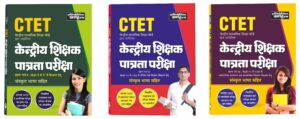
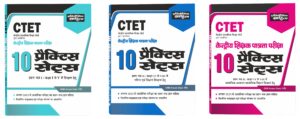
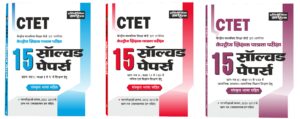
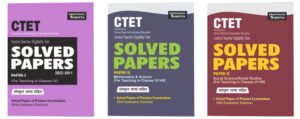
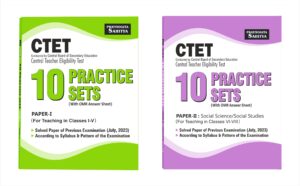
CTET 2023 Faq
- 1. What is the validity period of ctet certificate?
Ans. Ans. The Validity Period of CTET qualifying certificate for appointment will be for life time for all categories.
- 2. Is there any restriction or the number of attempts a person can take for requiring a ctet certificate.
Ans. There is no restriction or the number of attempts a person can take for requiring a CTET certificate.
A person who has qualified CTET may also appear again for improving his/her score.
- 3. Is there any negative marking scheme for ctet paper 1 and 2.
Ans. There are no negative marking scheme for paper 1 and 2 of ctet.
- 4. Is there any upper age limit specified for ctet exam?
Ans. No, there is no upper age limit specified for the exam. The candidates should be at 17 years of age.
- 5. What is qualifying marks for ctet exam.
Ans. As per NCTE Notification No-76-4/2010/NCTE Acad dated : 10-02-2011 : A person who score 60% more in the TET will be considered as TET pass.
- 6. In which medium is ctet exam conducted.
Ans. ctet exam conducted in both languages Hindi & English.







